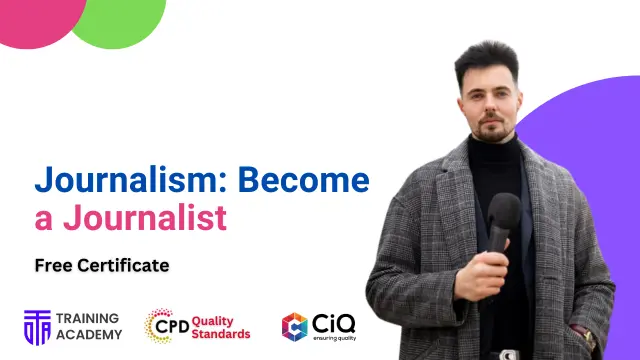
Journalism: Become a Journalist
CPD Accredited ! Free Certification | FREE Retake Exam | Lifetime Access | No Hidden Fees
Online Training Academy
Summary
- Digital certificate - Free
- Reed Courses Certificate of Completion - Free
- Tutor is available to students
Add to basket or enquire
Overview
Are you passionate about uncovering stories, reporting on current events, and making a difference through the power of words? Our comprehensive course, "Become a Journalist," is designed to equip you with the essential skills and knowledge needed to thrive in the dynamic world of journalism.
Key Features:
- CPD Certified
- Free Certificate from Reed
- CIQ Approved
- Developed by Specialist
- Lifetime Access
Certificates
Digital certificate
Digital certificate - Included
Reed Courses Certificate of Completion
Digital certificate - Included
Will be downloadable when all lectures have been completed.
CPD
Curriculum
Course media
Description
This journalism course covers essential topics to equip learners with foundational and specialized skills. It begins with understanding the principles, history, and ethics of journalism, ensuring a solid grounding in journalistic practice. Learners delve into legal aspects like journalism law and regulatory bodies, crucial for navigating media environments responsibly. They also learn about health and safety considerations specific to journalists, promoting their well-being in challenging situations.
The course emphasizes practical skills such as writing techniques for journalistic pieces, including news reports and feature stories. It covers interviewing methods to gather information effectively and explores the complexities of defamation issues in journalism. Additionally, learners are introduced to various platforms like newspaper, online, freelance, radio, and television journalism, each requiring distinct approaches and techniques. Niche journalism is also explored, offering insights into specialized reporting areas. Overall, the course prepares learners to become adept journalists by blending theoretical knowledge with practical application across diverse media formats.
Course Curriculum
- Module 01: Introduction and Principles of Journalism
- Module 02: History and Development of Journalism
- Module 03: Journalism Ethics
- Module 04: Journalism Law
- Module 05: Media Regulatory Bodies
- Module 06: Health and Safety for Journalists
- Module 07: Becoming a Journalist
- Module 08: Writing Skills for Journalists
- Module 09: News Writing, Production and Reporting
- Module 10: Tips on Writing a Good Feature Story
- Module 11: Interviewing
- Module 12: Defamation
- Module 13: Newspaper Journalism
- Module 14: Online and Freelance Journalism
- Module 15: Radio Journalism
- Module 16: Television Journalism
- Module 17: Niche Journalism
Learning Outcomes:
- Understand principles guiding journalism ethics and legal responsibilities in practice.
- Develop proficient news and feature writing skills for various media platforms.
- Demonstrate knowledge of historical evolution and current trends in journalism.
- Acquire interviewing techniques essential for effective journalism practice.
- Apply knowledge of media regulatory bodies and their impact on journalism.
- Gain insights into specialised fields like radio, TV, and online journalism.
Who is this course for?
- Individuals aspiring to pursue careers in journalism.
- Students interested in learning journalistic ethics and legal frameworks.
- Writers keen on enhancing their news and feature writing skills.
- Those seeking knowledge in interviewing techniques and media regulations.
- Professionals looking to specialize in radio, TV, or online journalism.
Career path
- Newspaper Journalist
- Online Journalist
- Radio Broadcaster
- TV Reporter
- Freelance Journalist
- Investigative Journalist
Questions and answers
Currently there are no Q&As for this course. Be the first to ask a question.
Reviews
Currently there are no reviews for this course. Be the first to leave a review.
Legal information
This course is advertised on reed.co.uk by the Course Provider, whose terms and conditions apply. Purchases are made directly from the Course Provider, and as such, content and materials are supplied by the Course Provider directly. Reed is acting as agent and not reseller in relation to this course. Reed's only responsibility is to facilitate your payment for the course. It is your responsibility to review and agree to the Course Provider's terms and conditions and satisfy yourself as to the suitability of the course you intend to purchase. Reed will not have any responsibility for the content of the course and/or associated materials.


